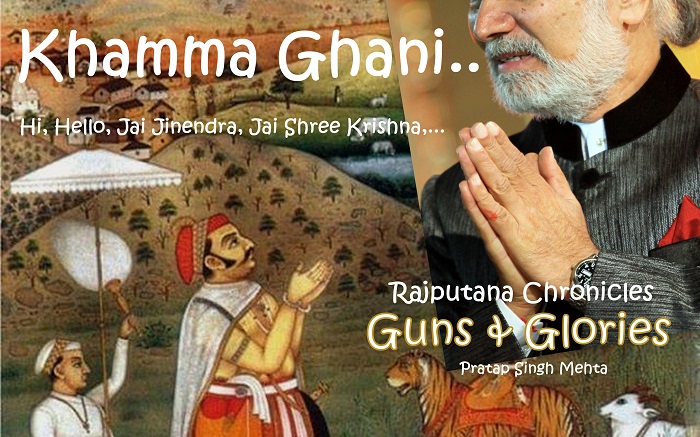Like Hi, Hello, Jai Jinendra, Jai Shri Krishna, the ‘Khamma Ghani’ is a general greeting in the Rajasthani language said to have originated in the Mewar Empire in the early 8th century and widely used by Rajputs / Kshatriyas all over and Rajasthani people in particular, today.
Pushpendra Singh Ranawat, Geo-Heritage consultant and writer, notes that Rawal Kaalbhojaditya (काल्भोजदित्य, 735-753 AD), the first Guhilot king of Chittaudgadh, Mewad successfully repelled Arab invaders well west of Sindh. Kaalbhojaditya was bestowed the title of “Bappa Rawal” (like Mahatma Gandhi being called Bapu, the Father of Nation) for protecting the millennia-old Indian culture, from Muslim / Arab invaders.
Ranawat says, “Bappa Rawal’s successor Rawal Khumaan I (रावल खुमाण, 753-773 AD) successfully repulsed numerous Arab attacks on the western frontier of Greater India. This mission was valiantly continued by Rawal Khumaan II (828-853) who fought & won 24 major battles including an Abbasid Caliph army led by Al-Ma’mun in which he led a combined force of 40 Hindu Kings. His exploits are immortalized in “KHUMAAN RASO” (खुमाण रासो), the poetic chronicle preserved in writing for posterity by the 17th century Jain Muni, Acharya Dalpati Vijay. Likewise, Rawal Khumaan III (878-912) equally well protected the local culture.”
Ranawat continues with pride, “Bappa Rawal and the three Rawal “Khumaans” served the nation for over a century, following which Hindustan (India) witnessed a period of tranquillity & prosperity for over three hundred years, up to 1000 AD”
It is therefore, to honour Rawal ‘Khumaans’, that the salutation “Ghani-Ghani Khamma” meaning ‘Many-many Khumaans’, meaning, may we be blessed with many a Khumaans gained currency. Ghani Khamma, Khamma Ghani, Khumaana-ra-kunwar ne ghani khamma (खुमाण रा कुंवर ने घणी खम्मा), etc. started.
However, a very colloquial and ill-informed version of its interpretation is that the word “Khamma” literally originates from “kshama”, or forgiveness; and “Ghani” means “a lot”. Hence the greeting was solicited in advance for any offence or ill-feelings raised by the course of one’s words/actions.
Today, it has evolved to signify “many greetings” / “many blessings”, used very commonly as a “hello” or a “welcome”. Khamma Ghani is like hello in Rajasthani and is responded with Ghani Khamma and simply Khamma, if you are the elder person.

25 thoughts on “What is the meaning of Khamma Ghani (खम्मा घणी)?”
Proud to be an Indian & Rajasthani
Sir can you please show me proof and source of your research
Khamma Ghani sa
Thanks Durgesh.
How to write Namaste in Rajsthani language
Rajasthani is also written in Devanagri script. Namaste is widely accepted form of greetings across India, including Rajasthan. Other accepted forms vary from community to community n faith. Vaishnavas, say Jai Shri Krishna. Jains say Jai Jinendra. Rajputs say Khamma Ghani, many say Jai Ramji ki, Sikhs say Sat Sri Akal, etc…
Loved the meaning and was so nice to know what it truly means, even as I hear the word being spoken around me so often.
Thanks.. I am happy you liked it. Subscribe to my site to receive e-mails in future.
Khamma Ghani in Rajasthani language Sir,
Namaste in Indian Language,
Hello or Hi in English,
مرحبا , in Arabic languade…
I’m an Egyptian Girl, arts is my Passion, and since long time I was fallen in love with India, and History of India became my passion, I usually using Wikipedia when I want to reach to any knowledge or information And finally I got what I want in your blog, and my first steps to A Journey To Happiness Or A Journey Of Happiness will start with your wonderful blog, Thank you so much Sir. please accept my respect .
Nadu Youssef from Egypt.
Thank Nadu Youssef… for your interests and research. God bless you.
Very informative
Thanks
Proud to be an Indian & Rajasthani
Thanks Paresh for your interest
How to translate “My Dear daughter in “rajasthani
Thank for lovely question… म्हारी लाडली / म्हारी लाडेसर /
मारी प्यारी बालकी
मारी प्यारी बालकी or मारी लाड्ली बेटी
धन्यवाद |
Very informative
Thank you Sandeep
INFORMATIVE, ONE SHOULD KNOW ONES PAST
BABULAL
Thanks Babulal..
Very informative article.
Thanks
Very informative!
Thanks.